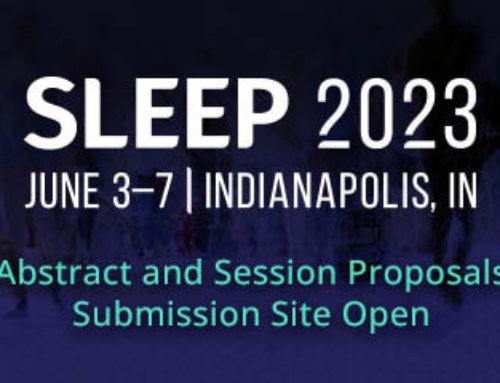EMBARGOED FOR RELEASE
June 10, 2008, at 12:01 a.m.
CONTACT:
Kathleen McCann
(708) 492-0930, ext. 9316
WESTCHESTER, Ill. – A research abstract that will be presented on Tuesday at SLEEP 2008, the 22nd Annual Meeting of the Associated Professional Sleep Societies (APSS), is one of the first to demonstrate the negative impact of hospitalization on sleep quantity and quality in children and their parents, in particular for younger patients and on the first night of hospitalization.
The study, authored by Lisa J. Meltzer, PhD, of Children’s Hospital of Philadelphia and the University of Pennsylvania School of Medicine, focused on 81 children between six and 21 years of age and 82 parents, who completed the Sleep in a Children’s Hospital questionnaire, providing information about sleep habits at home, the previous night’s sleep while hospitalized, and sleep disruptors (e.g., pain, noise, procedures).
According to the results, sleep patterns significantly differed during hospitalization, with younger children reporting a later bedtime, later wake time, more night wakings, and shorter total sleep time, and older children reporting a significantly later wake time, more night wakings, and longer total sleep time. There was a first-night effect for hospitalization of significantly earlier wake time and shorter total sleep time. Fourteen percent of children took medication for sleep while hospitalized (vs. two percent at home). Parents reported significantly more night wakings. Alarms on medical equipment and people talking in the hallway were the most bothersome noises for both children and parents, while nurses taking vital signs, the child’s pain, and noise in the room were the most frequent sleep disruptors.
“Sleep is significantly disrupted for hospitalized pediatric patients and their parents, especially for younger children and on the first night of hospitalization,” said Dr. Meltzer. “As sleep is essential for health and healing, interventions are needed to address the causes of these sleep disruptions, including reducing noise and optimizing pain management.”
It is recommended that school-aged children get between 10-11 hours of nightly sleep, children in pre-school between 11-13 hours, and adults between seven to eight hours.
The American Academy of Sleep Medicine (AASM) offers some tips to help your child sleep better:
- Follow a consistent bedtime routine. Set aside 10 to 30 minutes to get your child ready to go to sleep each night.
- Establish a relaxing setting at bedtime.
- Interact with your child at bedtime. Don’t let the TV, computer or video games take your place.
- Keep your children from TV programs, movies, and video games that are not right for their age.
- Do not let your child fall asleep while being held, rocked, fed a bottle, or while nursing.
- At bedtime, do not allow your child to have foods or drinks that contain caffeine. This includes chocolate and sodas. Try not to give him or her any medicine that has a stimulant at bedtime. This includes cough medicines and decongestants.
The AASM offers the following tips for adults on how to get a good night’s sleep:
- Follow a consistent bedtime routine.
- Establish a relaxing setting at bedtime.
- Get a full night’s sleep every night.
- Avoid foods or drinks that contain caffeine, as well as any medicine that has a stimulant, prior to bedtime.
- Do not bring your worries to bed with you.
- Do not go to bed hungry, but don’t eat a big meal before bedtime either.
- Avoid any rigorous exercise within six hours of your bedtime.
- Make your bedroom quiet, dark and a little bit cool.
- Get up at the same time every morning.
It is important to make sure that your child gets enough sleep and sleeps well. The value of sleep can be measured by your child’s smiling face, happy nature and natural energy. A tired child may have development or behavior problems. A child’s sleep problems can also cause unnecessary stress for you and the other members of your family.
Parents who suspect that their child might be suffering from a sleep disorder are encouraged to consult with their child’s pediatrician or a sleep specialist. Parents suffering from a sleep disorder themselves are encouraged to consult with their primary care physician or a sleep specialist.
More information about “children and sleep” is available from the AASM at https://www.SleepEducation.com/Topic.aspx?id=8.
The annual SLEEP meeting brings together an international body of 5,000 leading researchers and clinicians in the field of sleep medicine to present and discuss new findings and medical developments related to sleep and sleep disorders.
More than 1,150 research abstracts will be presented at the SLEEP meeting, a joint venture of the AASM and the Sleep Research Society. The three-and-a-half-day scientific meeting will bring to light new findings that enhance the understanding of the processes of sleep and aid the diagnosis and treatment of sleep disorders such as insomnia, narcolepsy and sleep apnea.
SleepEducation.com, a patient education Web site created by the AASM, provides information about various sleep disorders, the forms of treatment available, recent news on the topic of sleep, sleep studies that have been conducted and a listing of sleep facilities.
Abstract Title: Sleep in Hospitalized Pediatric Patients and Their Parents
Presentation Date: Tuesday, June 10
Category: Pediatrics
Abstract ID: 0270
# # #








